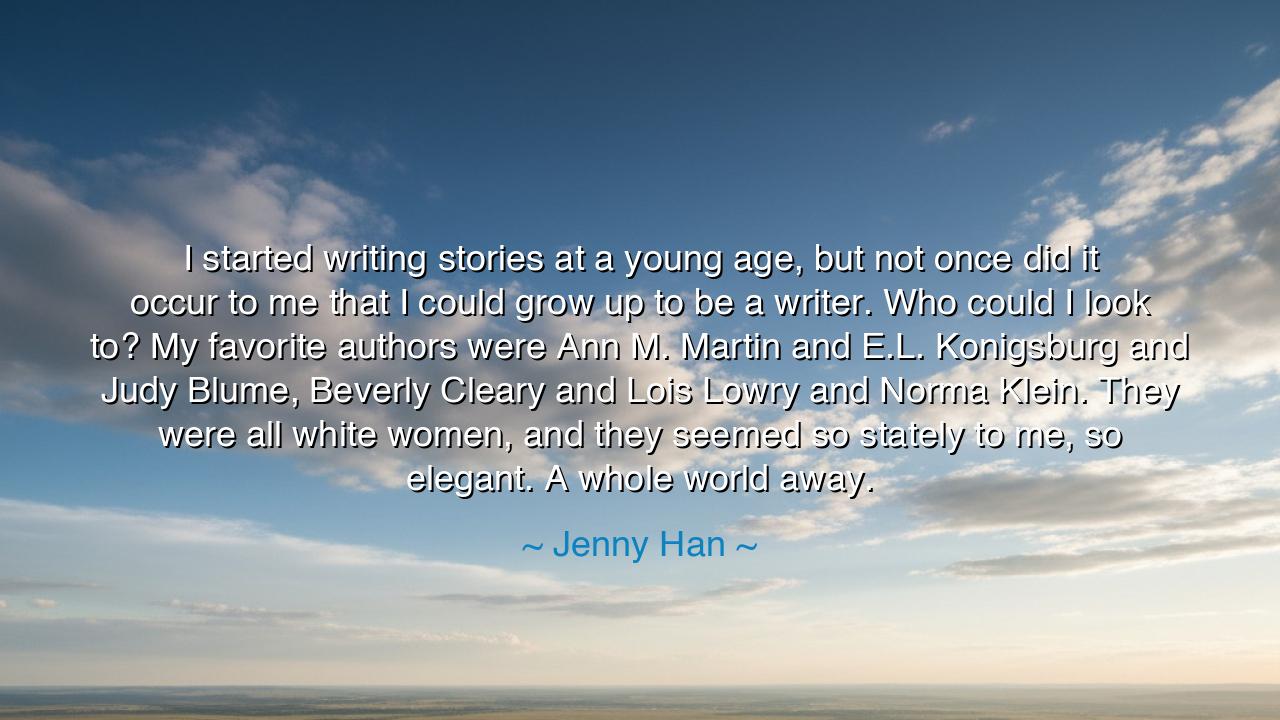
I started writing stories at a young age, but not once did it
I started writing stories at a young age, but not once did it occur to me that I could grow up to be a writer. Who could I look to? My favorite authors were Ann M. Martin and E.L. Konigsburg and Judy Blume, Beverly Cleary and Lois Lowry and Norma Klein. They were all white women, and they seemed so stately to me, so elegant. A whole world away.






“I started writing stories at a young age, but not once did it occur to me that I could grow up to be a writer. Who could I look to? My favorite authors were Ann M. Martin and E.L. Konigsburg and Judy Blume, Beverly Cleary and Lois Lowry and Norma Klein. They were all white women, and they seemed so stately to me, so elegant. A whole world away.”
Thus spoke Jenny Han, the chronicler of youth, memory, and longing—a voice that gave shape to the hearts of a generation. Her words are more than recollection; they are an invocation of distance and awakening, a confession of what it means to grow up unseen. In them, we hear the ache of a young soul yearning to belong in a realm that did not yet have a place for her reflection. For her, the dream of writing was like a distant constellation—beautiful, glowing, but forever a whole world away.
In those few lines, Jenny Han unveils a truth as ancient as humanity itself: that a person must see themselves reflected in order to believe they are possible. The imagination may soar without limits, but the heart, if starved of mirrors, begins to believe it is invisible. When she looked at the shelves that lined her youth, they were filled with voices she loved, but none that resembled her own. The elegance and stateliness she admired felt unattainable because they were not rooted in her experience. Thus, the young writer’s dream slumbered—not from lack of passion, but from lack of representation, that sacred connection between identity and possibility.
This is no new struggle. In every age, those who come from the margins have faced the same unseen wall. The ancient poet Sappho, whose verses once lit the Aegean sky, wrote from the island of Lesbos when most poets were men crowned by the state. She too must have felt distant from the halls where her art was judged. Yet she wrote anyway, and her fragments still burn with fire. So too did Phillis Wheatley, born in chains yet writing with a voice that astonished the mighty of her time. Each of these women looked into a world that seemed a whole world away—and built a bridge to it through their courage.
Jenny Han, in her own time, took up that same labor of love. From a childhood where books whispered in accents not her own, she forged her own language—one that sang of Asian American girlhood, of quiet strength, of the tender and powerful ache of becoming. In doing so, she not only claimed her voice but became the mirror she once lacked. Now, the young girl who looks upon her stories no longer sees a distant, stately figure, but one who looks like herself. Thus, what was once an unattainable world has drawn closer; what was once impossible is now an inheritance.
And yet, this story is not hers alone—it belongs to every soul who has been told, by silence or by omission, that their dreams do not belong to them. The world of art, like the world itself, is shaped by those who dare to enter it. When we write, paint, speak, or create, we do not only express ourselves—we carve open a doorway for others to follow. Each voice that rises from obscurity becomes a beacon for the next generation. This is how the circle of invisibility is broken—through courage, through persistence, through the radical act of self-belief.
The lesson of Jenny Han’s words is both tender and thunderous: representation is not vanity—it is survival. To see oneself in art is to be told, “You belong to the story of the world.” Without that belonging, the heart withers in quiet resignation. But when the young girl, the young boy, the outsider, the forgotten, sees a reflection of themselves in creation—they awaken. They begin to believe not only in their dreams, but in their right to dream them.
So, my children of the written word, take this wisdom and keep it close: be the reflection you once longed to see. If the world offers you no mirror, make one from your own truth. Write, speak, sing, paint—fill the silence with your presence. The next soul, wandering and unsure, will find themselves in your courage. In this way, every voice becomes an ancestor, every dreamer a bridge.
Practical teaching: Do not wait for permission to create. Tell the stories only you can tell. Seek out the voices that resemble your own and uplift them; seek also those that do not, and listen with reverence. For as Jenny Han reminds us, the distance between you and your dream is not the width of the world—it is the width of a single brave act. And when you take it, you will bring others across that bridge with you.






AAdministratorAdministrator
Welcome, honored guests. Please leave a comment, we will respond soon